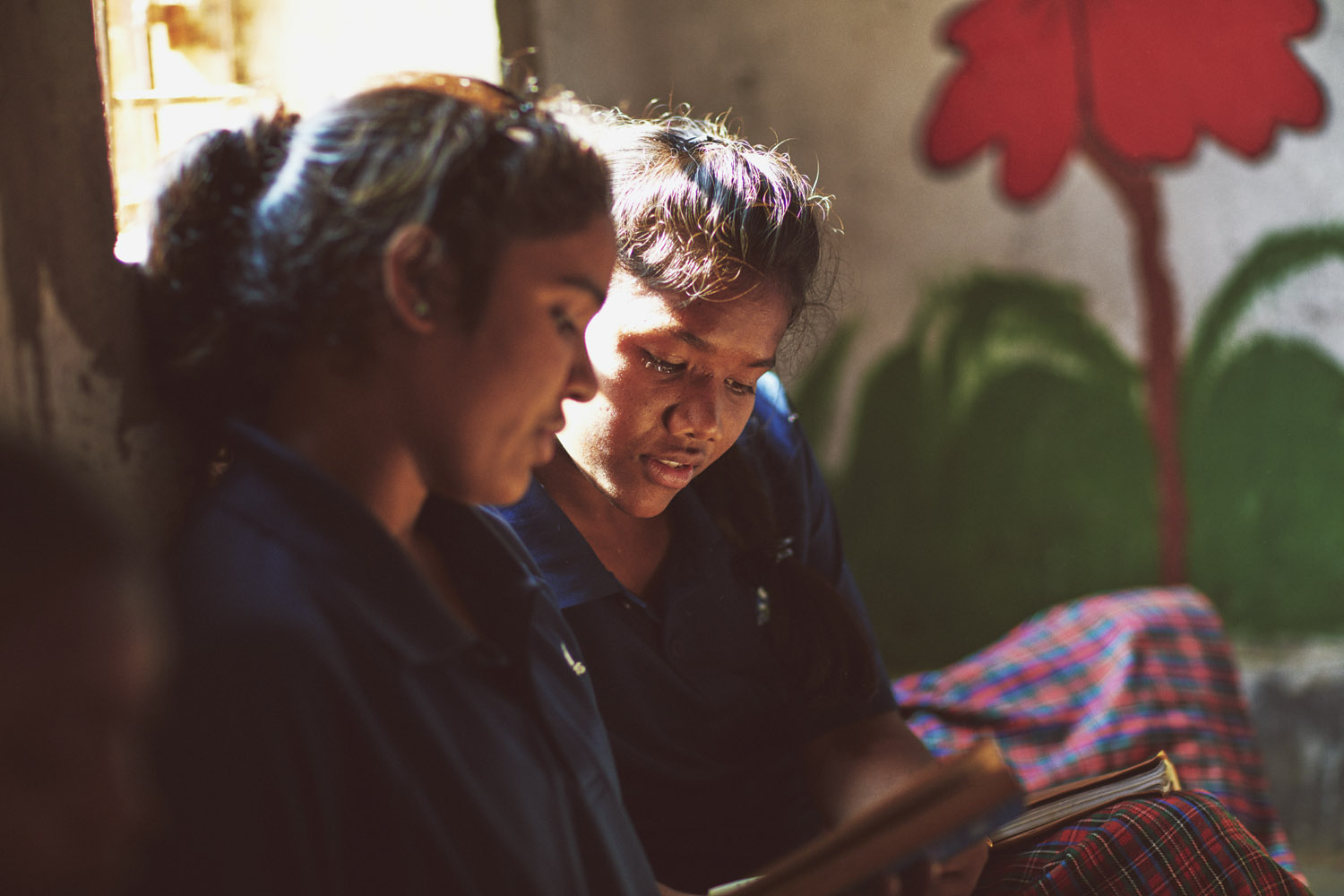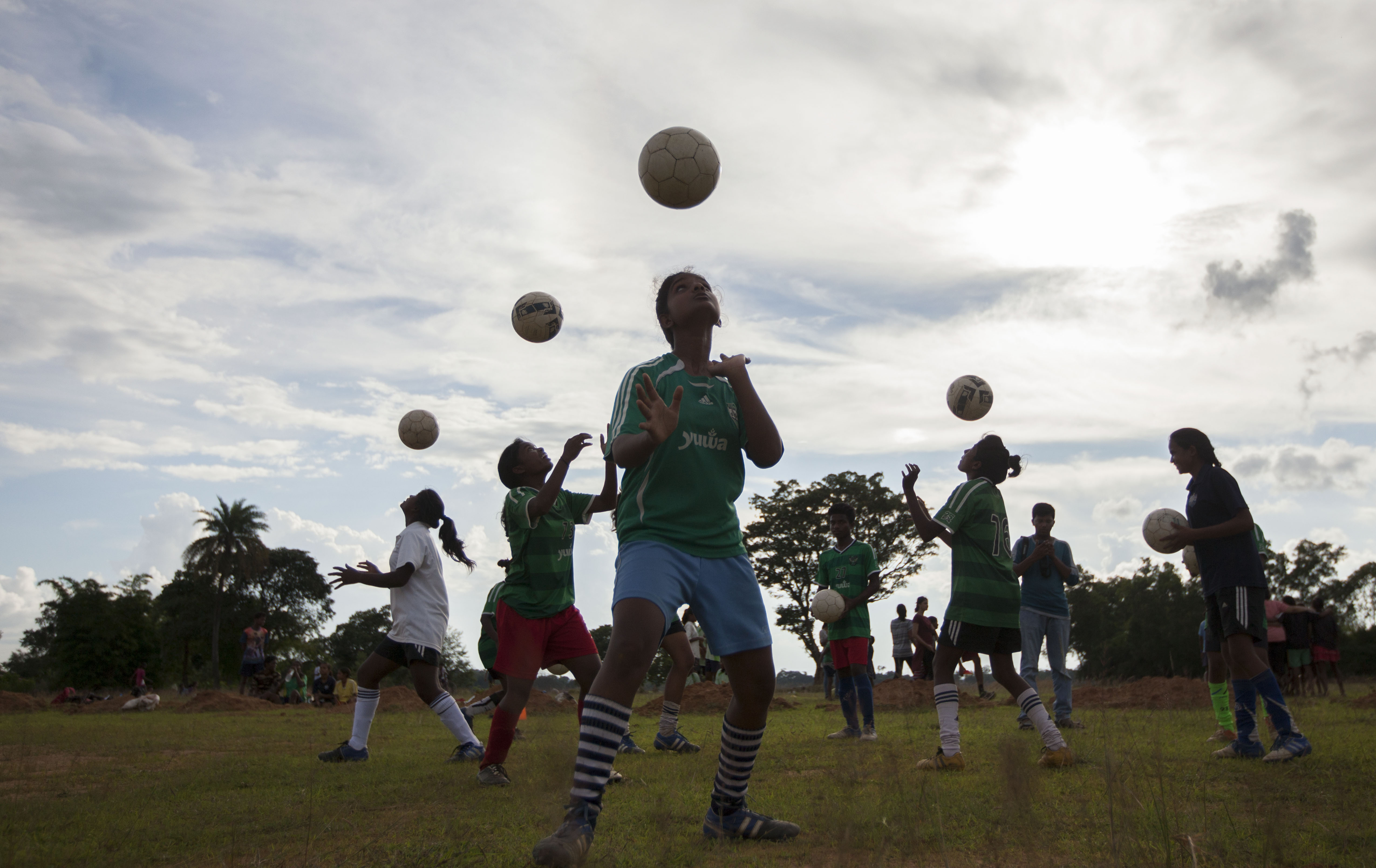In the eastern Indian state of Jharkhand, girls don’t grow up with many opportunities. The state is notorious for human trafficking and 6 in 10 girls living there are married during childhood, according to UNICEF.
“I have never seen such a gender contrast as here,” says Franz Gastler, executive director and co-founder of Yuwa, an NGO that works with girls from socially and economically disadvantaged families in rural Jharkhand.
In 2008, Gastler set up Yuwa – which means “youth” in Hindi – as a scholarship program for a group of eight deserving students, three boys and five girls. The following year, some of the girls asked Gastler to teach them to play soccer, so Yuwa started a soccer club to engage with young boys and girls in a village near Jharkhand’s capital, Ranchi.
On the first day of training, 100 girls showed up – but no boys. “The boys said they had other options,” Gastler says. But for the girls, who are expected to stay home and help around the household, soccer is perhaps their only chance to break from social constraints and, for a few hours at least, exert their independence.
Today, Yuwa has 300 players, more than 90 percent of them girls. The girls have competed in international championships – including the 2014 Schwan’s USA Cup – and spoken at TEDx conferences, universities and symposiums in India and abroad. Their achievements have earned them the status of celebrity ambassadors for UNICEF.
Gastler spoke to Women & Girls Hub about how the program works and how it helps to ensure that the girls who take part stay in education.
Women & Girls Hub: What does Yuwa aim to achieve in a state like Jharkhand, which has some of India’s worst social and economic indicators, such as high school dropout rates, dowry-related violence and child marriage?
Franz Gastler: Yuwa empowers girls through team sports and education in one of the most impoverished regions of rural India. It focuses on providing girls with world-class education and leadership training.
In April 2015, we launched Yuwa School, a full-time English-medium primary school for girls from SC/ST [Scheduled Castes and Scheduled Tribes, groups officially classified as being socially and economically “backward”] and OBC [Other Backward Classes] backgrounds, with the goal of preparing young women for top universities.
In 2017, Yuwa will open its first Centre for Girls’ Leadership Development. This school for 320 girls will be a regional hub for sustainable empowerment, and will include a university-preparatory school, leadership hostel, sports training and regional outreach programs.
With our intensive and holistic programs, we empower girls to become the next generation of female change-makers in India.

Women & Girls Hub: How do you enroll underprivileged children into your program and what problems do you face when you try to reach out to girls and their families to get them interested in joining?
Gastler: Often girls are eager to join Yuwa School to escape abusive teachers and boring classes with 100-plus students to one teacher. But many parents are resistant to paying the small fee [up to 500 rupees ($7.5)] and also to their daughter dropping back one or two grade levels to be in a class where she is learning well. Yuwa teachers and mentors counsel parents, encouraging them to understand the benefits of a quality education for their daughter.
Most of the girls in Yuwa are Hindu or tribal. To include more Muslim girls, we encourage girls to invite their Muslim friends to join. Then we make efforts to meet with their parents and help them understand our programs and goals. Our landlord and bus driver, both of whom are Muslim and adamant supporters of Yuwa, assist us in those meetings. We also meet with the local government officials to maintain a positive relationship and make it easier for girls of all backgrounds to join.
A boy can also join Yuwa, but he must bring four girls [to maintain a minimum 80:20 ratio of girls to boys]. In villages teeming with children, it’s not a big challenge, but few boys want to go to the trouble.
Women & Girls Hub: How do you ensure the girls don’t drop out of school?
Gastler: When Yuwa was originally founded, it was a scholarship fund designed to give diligent students in low-quality local government schools the chance to attend a higher-quality local private school. Girls who were just on the scholarship would come to Yuwa once a month to collect their school fees – by the end of the first year, they had missed 40-50 days of school. But when we shifted our direction to include football, the girls playing on the team came to Yuwa every day, and through the power of their team social network they encouraged one another to go to school to the point where they rarely missed a day.

Women & Girls Hub: India is known to be a cricket-crazy nation – soccer is popular only with boys in a few parts of the country. So what made you chose soccer as a tool to engage with the girls of Jharkhand?
Gastler: The model of a football team has proven to be an exceptionally powerful way of building what are essentially girls’ self-help groups. Within the team, the girls create a counterculture where it’s cool to be an ambitious girl. The Yuwa girls have told us – again and again – that they love playing football together.
Our education and health programs are linked and held together by the strength of the football teams – and positive peer pressure.
Women & Girls Hub: What kind of change has Yuwa been able to bring about in Jharkhand?
Gastler: When we started Yuwa School last year, we had five full-time teachers teaching 45 students in grades 1 through 8. This year, enrollment increased to 80 students, with seven full-time teachers.
Thirty-two out of 39 young Yuwa coaches are girls and are actively involved in decision-making for the football program. Senior girl players are taking on more leadership roles: five have started leading life-skills workshops, seven are teaching after-school English and math classes and more than 25 have spoken publicly. Every week, girls express themselves in workshops and bring up topics that are normally taboo – such as child marriage, alcoholism and domestic abuse.
Yuwa’s child development officer has been visiting families two to three times a week to discuss future planning for their daughters. Girls have reported that parents become more supportive after these meetings. Yuwa also coordinates biannual workshops with Jharkhand policewomen about legal resources and rights.
This year, attendance in Yuwa’s classes has been excellent. And our teams compete extremely well against other top girls’ football teams from India and abroad.
Society tells girls to fit in. Yuwa coaches girls to stand out.

